All dogs have an innate desire to dig. It’s arguably natural, similar to how they wag their tails and yelp when they’re excited.
Anything from their DNA to seeking rodent holes, constructing a den, and attempting to escape, dogs dig for various reasons. However, they dig for fun most of the time to keep themselves occupied and relieve stress.
While certain dog breeds dig to some extent, some are more dedicated diggers. There are dog breeds that have more proclivities to dig than others. Unfortunately, owning an active digger can be quite a nuisance as it can ruin your well-kept lawn, destroy your carpet, and make a mess of your bed.
So, whether you need a digger or trying to avoid one, below are the 20 dog breeds that love to dig, which you may want to consider.
Understanding why dogs dig
Before delving into the dog breeds that love digging, it is essential to understand the reason behind the strong urge of certain dog breeds to dig. There are a variety of reasons why these dogs dig. Here’s to name a few.
Certain dog breeds have a digging tendency that dates back to their ancestors. Various dog breeds gained their natural desire to dig due to being bred to be hunters, working dogs, or farm dogs. Thus, even in current times, they have retained their digging instinct.
Dogs with a high hunting instinct will almost certainly like digging for tiny animals such as rodents, mice, and vermin. They become entirely immersed in their drive to dig, as they are hunters at heart.
While certain dog breeds were bred to dig, others dig to keep themselves comfortable in extreme weather conditions. This is true to Northern dog breeds.
Finally, lively dogs require some exercise and activity to burn their boundless energy. Otherwise, they will engage in damaging behaviors such as digging. Other dog breeds see digging as a fun activity when bored or anxious.
1. Bedlington Terrier

The Bedlington Terrier, which resembles a lamb more than a dog, was designed for hunting, particularly vermin and rodents. Northumberland miners also used these English breed dogs during the 1800s as ratters.
Because of this, their digging instinct has been kept up to this point. Bedlington Terrier dogs dig vigorously with a penchant for reaching rabbits and mice. Without an outlet for their energy and sufficient exercise, their digging behavior may wreak havoc to well-manicured gardens.
2. Cairn Terrier
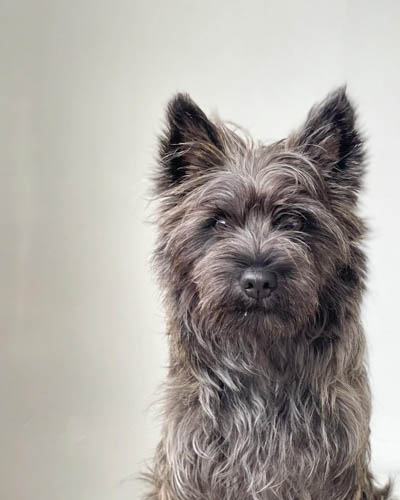
Native to Scotland’s Western Highlands, the Cairn is a diminutive yet active terrier breed that loves digging. Cairn Terrier dogs were bred to dig and eradicate underground rodents. Hunters at heart, they become fully entrenched in their desire to dig. So, having one will necessitate providing a safe space for digging.
Cairn Terrier dogs are also quite lively. To avoid causing unnecessary damage at home, they need to engage in activities to channel their boundless energy. Otherwise, unpleasant habits such as frequent biting and aggressive digging will develop.
3. Airedale Terrier
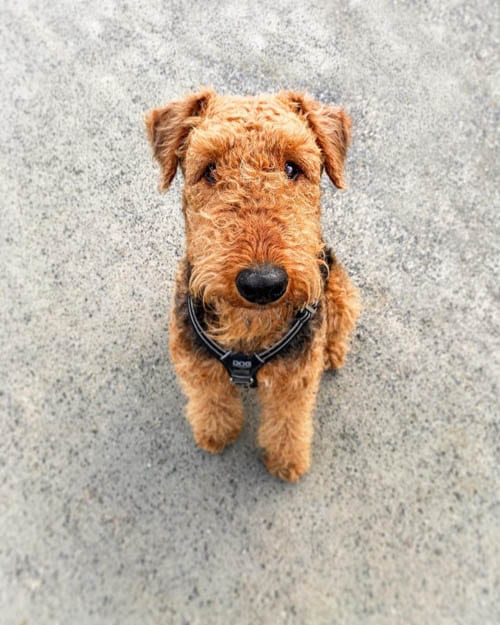
Like other terrier breeds, the Airedale Terrier is quite a digger, as well. Originating from the Aire Valley in Northern England, these dogs were trained to hunt ducks and mice. Their digging behavior has become a natural predisposition which they maintained until now.
They dig ferociously in search of critters or to make a little den. But they dig mostly for sheer fun. Because of this, it is ideal for providing them with a variety of activities and exercises for entertainment and distraction.
4. Jack Russell Terrier
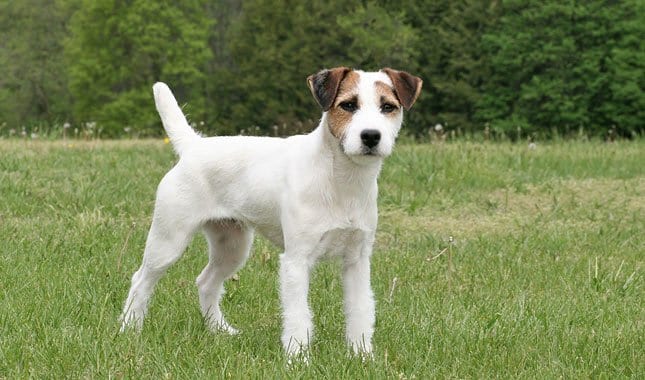
The Jack Russell Terrier was bred to hunt foxes above and below the ground. Reverend John Russell, the man who established the breed in the 1800s, gave it that name.
Jack Rusell Terrier dogs are energetic, hardworking, and bright. While they have an inherent digging instinct, they may also do it to curb their boredom. Therefore, make sure to devote time to activities that will allow them to expend their energy. Also, avoid leaving them alone to prevent them from resorting to destructive behaviors.
5. Border Terrier

Originally bred near Scotland’s border in England, the Border Terrier was trained to help shepherds and farmers protect sheep against foxes. They were also used to fit into burrows.
Their background and innate impulses heavily influence their digging activity. They will, unfortunately, enjoy a good dig in your well-kept yard.
6. Dachshund
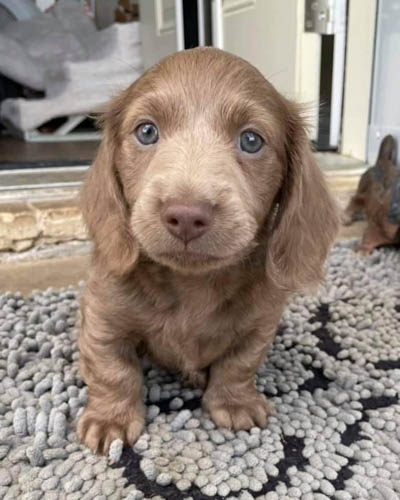
Originally bred to dig into burrows of badgers and other small prey, the Dachshund has existed for about 600 years. Despite their small legs, this German breed can dig deep into the ground to make tunnels for their hunting game.
Today, they still follow their automatic inclination to dig. They will most likely be spotted digging up garden beds in an attempt to evict the yard’s rodents. Due to their willful nature, Dachshunds may require behavior training to help them curb their strong urge to dig.
7. Beagle

The Beagle is an ancient hunting dog with a long history. As early as 55 B.C, they were thought to exist in England. Only during the 1500s when they were used for hunting hares. These modern beagles are known to be diggers, as well.
Still in existence today, Beagles have maintained their digging instinct. And, to keep them from chasing their prey underground and causing you unnecessary damage, it is best to give them exciting activities. You could also provide them with their own digging space.
8. Australian Shepherd
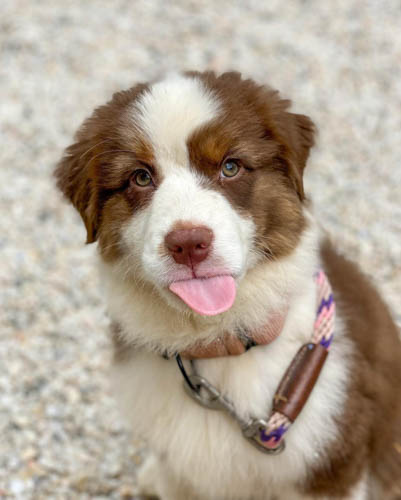
Despite the name, the Australian Shepherd dog breed did not originate down under. They were bred in the United States before they were brought to Australia. Australian Shepherds, fondly known as Aussies, were not bred with the intention of digging or hunting. They were, in fact, working dogs that assisted ranchers in herding animals.
Working dogs at heart, Aussies have maintained their active predisposition and high level of energy. Lack of exercise and activities, Aussies may be compelled to dig up lawns to expend their energy and fulfill their natural working inclination. So, providing them with some high-energy activities such as playing Frisbee is essential.
9. Border Collie
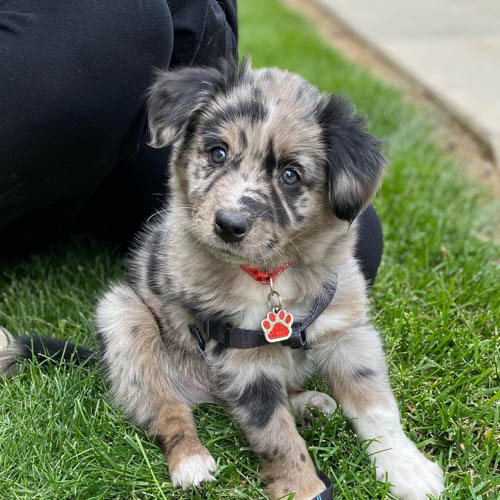
A cross between ancient Roman dogs and Viking spitz-like dogs from England, the Border Collie is an affectionate and energetic herding dog that thrives on human companionship and working. As a result, they will require much activity and attention. If not, they may resort to digging to keep themselves occupied.
10. Siberian Husky
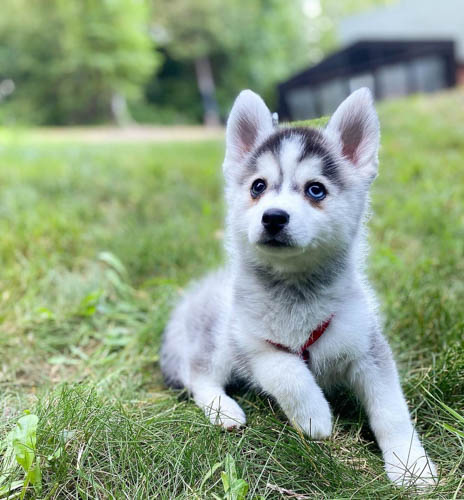
The Siberian Husky is one of the oldest dog breeds, with a history that dates back over 4000 years. Huskies are thought to have originated with the Chukchi tribe of Siberia as sled dogs.
Their coats provide insulation from extreme weather conditions. But, they dig to make a den to keep them warm or cool during extreme temperatures, as many northern breeds did.
Siberian Huskies have preserved their instincts to this day. As a result, they often resort to digging when they are bored. And because they are active dogs, it is essential to give them plenty of exercise and activity to keep them preoccupied. Without such, expect to see a lot of holes in your garden.
11. Alaskan Malamute
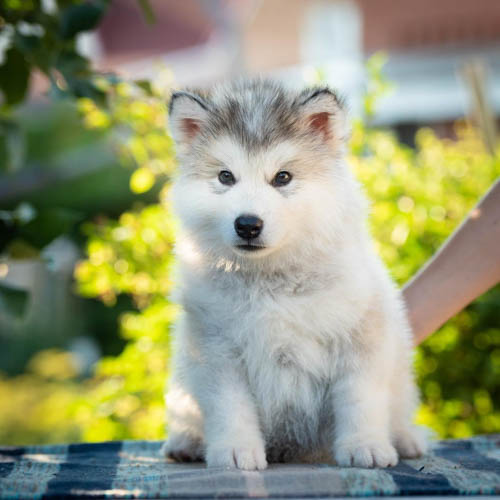
Another northern breed, the Alaskan Malamutes, had sprung from a Paleolithic wolf-dog 4,000 years ago. They were active working dogs and companions of hunters.
In the harsh Alaskan winter, the Malamutes dig to create a burrow to keep them warm. On scorching summer months, on the other hand, they dig to cool themselves underground.
Today, if they have no shelter or protection from the extreme weather, you can expect to see them digging in your yard, keeping them much more comfortable.
12. Basset Hound

The Basset Hound is native to France and Belgium. These low to the ground dogs were originally bred to be hunting dogs used to dig into holes searching for their prey. And since they have a natural inclination to dig, it is inevitable to see them digging up your lawn.
13. Miniature Schnauzer

The Miniature Schnauzers from Germany were bred during the 1500s as smaller versions of the standard-sized Schnauzer. Their small stature makes them ideal for digging holes, specifically eliminating rats.
While Miniature Schnauzers are intelligent and lovable dogs, they have retained their desire to dig until today. Without sufficient attention, play, and exercise, they will undoubtedly spend their limitless energy digging up your garden.
14. Wirehaired Pointing Griffon
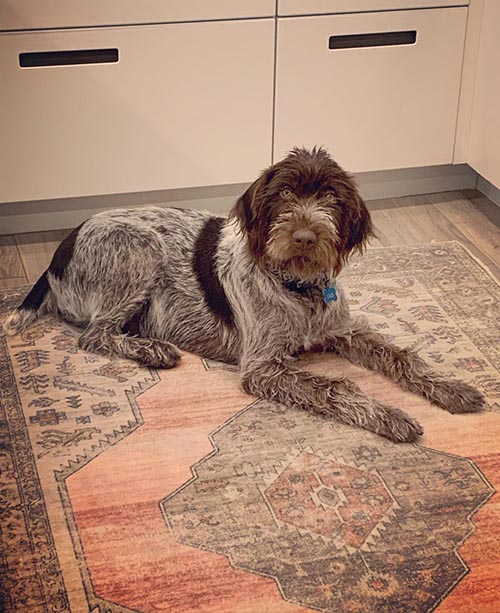
Native to Germany and Netherlands, the Wirehaired Pointing Griffon was bred to be a strong hunter. These energetic dogs have a strong urge to hunt and thrive on companionship, making them excellent sporting dogs.
Although they were raised as hunters, they may also work as diggers. So, if you’re thinking of getting a Wirehaired Pointing Griffon, make sure you arrange activities to keep it busy and distracted. Otherwise, its abilities may be channeled into the ground.
15. Bloodhound

Bloodhounds were not designed to get inside holes or burrows in the first place. They were bred to hunt boar, deer, and other similar animals. They were, in fact, excellent runners and skilled trackers. In modern times, they still have a strong desire to search for wildlife due to their hunting instinct.
Because of their natural exuberance, Bloodhounds may seek strenuous exercise and entertaining activity. If they do not put their abundant energy into something worthwhile, they may resort to digging. Bloodhounds may find digging an interesting distraction, especially when bored or alone.
16. Chow Chow

Chow chows are a primitive breed. And, like the Siberian Husky, this dog breed digs to stay cool in hot weather. At present, Chow chows have retained their digging inclination.
With this, they may resort to digging for a variety of reasons. Most of the time, however, they dig out of boredom. So, make sure to provide plenty of worthwhile things to do. This will prevent them from harming your meticulously maintained flower garden or ruining your newly purchased carpet.
17. Australian Terrier

The Australian Terrier is a cross between several British Terriers. And, in the 1800s, they were imported to Australia. Like other Terrier breeds, the Australian Terrier has a strong digging drive. Historically, they were bred to eradicate rats, snakes, and vermin. With this, they had to do some digging to find their prey.
Their digging tendency has continued up to this point and can be extremely bothersome. If you are planning on having one, make sure to give them plenty of activities to deter them from digging underground in quest of a little furry prey.
18. Norwich Terrier
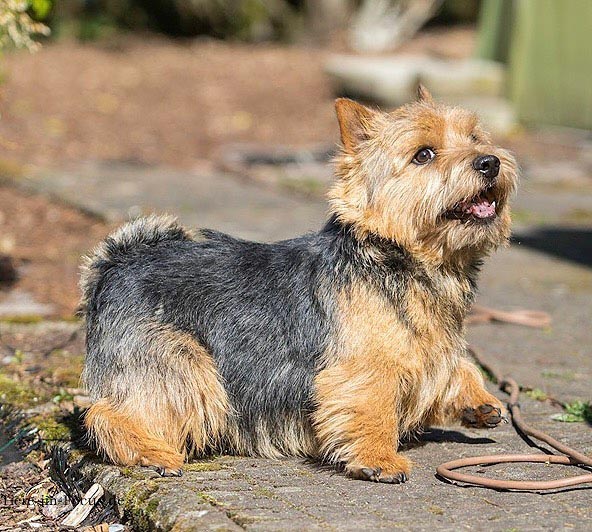
The Norwich Terrier is another Terrier breed that enjoys digging. Back then, they were used in fox hunting and eliminating rats. They were also popular among Cambridge University students in the late 1800s because they served as companions and eradicated rats in the dormitories.
As a result, the Norwich Terrier dogs’ hunting instincts drive their desire to dig. So, expect to see them excavating burrows to their hearts’ delight and having a nice digging session in your well-kept garden.
19. West Highland White Terrier
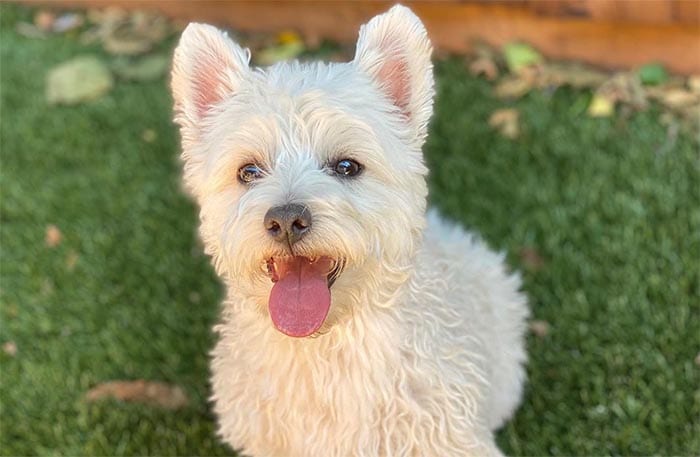
Also known as Westie, West Highland White Terrier dogs are originally bred for hunting small rodents. Westies are active terriers that enjoy digging just like other terrier breeds.
In the pursuit of reaching their prey, they acquired the digging impulse, which they have utilized until now. As mentioned, Westies are active dogs. If left alone, they may turn to dig as their fun activity.
Thus, it is critical to spend time with them playing or exercising. This will serve as a distraction, allowing them to avoid making a mess on your lawn.
20. Rat Terrier
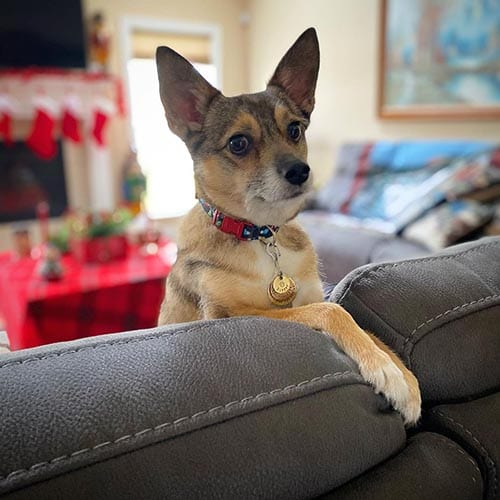
Originally bred for hunting rats on farms, the Rat Terrier, an American dog, makes an excellent farm dog. Rat Terriers were also used as a watchdog or a guardian.
Like a typical terrier, Rat Terriers are willful. Plus, they love to dig. They have a natural bias towards digging because of their history as hunters, watchdogs, and farm dogs. Thus, expect to see them digging holes in your yard.
It may be unnerving, but don’t worry; all you have to do is provide a digging space. You may also keep them occupied by giving them enjoyable activities to prevent them from digging and causing unnecessary damage.
